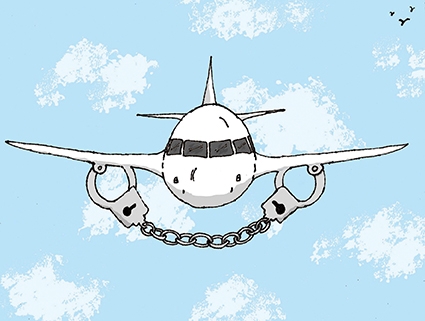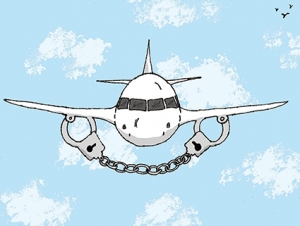The Ins & Outs
Georgian political scandals seem to have no end. One hasn’t finished yet and already the next one begins. This could be seen in last week’s political calendar. Just as the steam from the so-called scandalous conspiracy against the Patriarch seemed to be dissipating, Rustavi 2 threw another one at the Georgian Dream’s government: according to their information, the Azerbaijani journalist abducted recently in Tbilisi was discovered in the central detention isolator of Baku’s Border Service.
And so the new scandal began, developing with such “speed” that the governments of both Georgia and Azerbaijan were obliged to issue official statements. However, instead of giving answers, these gave rise to yet more questions. Soon, the European Union and the US Department of State got involved and the scandal became bigger than anyone could have imagined. So what was so different about this case that has caused so much tension? The wife of the kidnapped journalist, Khadija Ismayilova, declared that on May 29, Mukhtarli was allegedly kidnapped from Chonkadze Street in Tbilisi, forced into a car with his hands tied, eyes covered, and was beaten. Afterwards, the silent kidnappers supposedly changed car twice and in the third car the journalist heard the people talking in Azerbaijani. Afgan Mukhtarli was let out of the car in the neutral border zone of Georgia and Azerbaijani and led towards the checkpoint, where he was arrested by the border guards. And it was this information that stirred protests among the NGOs who were later joined by a range of “big” political players.
About the same scenario was seen in 2004, when Russia placed an ultimatum on the then-newly chosen President Mikheil Saakashvili to transfer two refugees from Chechnya which the Kremlin had accused of terrorism. Notably, the case of the two people had been reviewed by the court during President Shevardnadze’s government, with the “evidence” of the Russian Prosecutor's Office making innocents of both. Upon the return of President Saakashvili to Tbilisi, the Georgian special service kidnapped the Chechens and took them to the Larsi checkpoint to the Russians. For some reason, this case didn’t catch the expected attention of NGOs or society at that time.
In 2010, an Iranian scientist, who visited Georgia as a tourist, disappeared. Later, he was found in prison across the ocean; the Israeli press actively discussed the idea that he might have been “interesting” because he had some connection with Tehran's "nuclear program". Surprisingly, this case wasn’t followed by any significant protests, either; but didn’t all three of these cases exemplify the same level of violation of the country’s sovereignty and legislation?
In reality, as harsh as it may sound, both current and the former governments have been acting based on the limited capabilities of our small, weak, vulnerable and helpless country amid the uncontrollably cynical world that we are living in. The only difference is in the fact that Georgian Dream has let the genie out of the bottle so much so that putting it back is no longer possible. To put it more bluntly, before coming to power, the GD talked much about the authoritarian system of the United National Movement and how “amazed Europe was with the new Georgian democracy”- and now they are inevitably facing a dead end. Most importantly, they have found themselves caught in the trap of international politics without allies. What they are left with is a claim to being completely uninvolved in the abduction of Afgan Mukhtarli. And by doing so, they are only further deteriorating their situation and reinforcing their complete powerlessness.
Notably, very soon, the Georgian government will be facing a new challenge of whether to extradite one of the Private Demirel College managers Mustafa Emer Çabuk to the Turkish government, who is also accused of terrorism, but this time by the Turkish government and not the Russian.
Zaza Jgarkava












